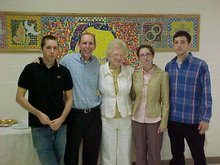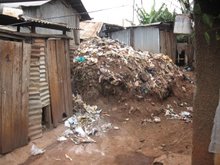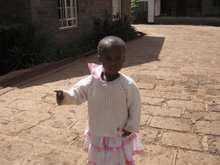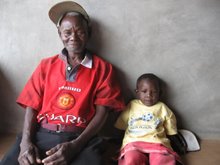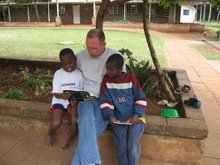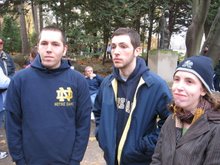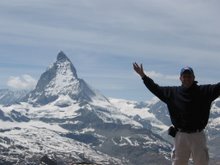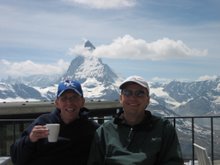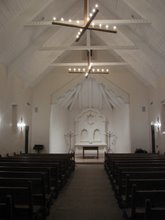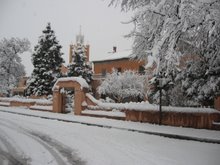KENYA: The little village that could
KITUI , 22 May 2008 (PlusNews) - The word 'nyumbani' means home in Swahili, and that is exactly what a pilot village in the eastern Kenyan district of Kitui is trying to provide for two generations devastated by the AIDS pandemic.
More than 250 orphans and 29 elderly people, all of whom have lost parents and children to AIDS-related illnesses live in the village. The children are placed under the guardianship of a grandparent - not necessarily their own - who is responsible for creating an atmosphere as close to a normal home environment as possible.
Most non-governmental organisations (NGOs) dealing with orphans and vulnerable children believe that placing children in extended family units in the communities they have lived in since birth is preferable to placing them in the unnatural environment of an institution, but many families are unable to cope with the additional mouths to feed and the orphans often end up homeless.
"Many of the children here were destitute, roaming the villages, begging or scavenging for food once their parents died," said Sister Mary Owens, co-founder of Nyumbani Village. "The village is halfway between an institution and the community. We try as much as possible to simulate normal village life, with grandparents and the children forming blended families." The village also tries to ensure that the children are brought up in the local Kamba tradition, and there is a separate house to accommodate older boys who have gone through the circumcision ritual. The village was opened in 2005 on 1,000 acres of land donated by the government of Kenya to the Roman Catholic Diocese of Kitui. Its youngest resident is two-and-a-half year old Tito, and its oldest is Monica, who is well into her nineties. "Being with the children keeps me feeling young," said Malonza Malembwa, one of two resident grandfathers. He does not know his age, but believes he is well over eighty, having been born around the time of "the great famine" in 1920. Malembwa has eight boys in his care: four are his biological grandchildren and the other four were placed with him after he came to the village. Being with the children keeps me feeling young
"When my daughter and son died, I couldn't afford to feed the grandchildren, so the Catholic Church took them in and fed them; when the village opened we all came here," he told IRIN/PlusNews. "Before we got here my grandsons and I were casual labourers on building sites, but now they are all in school."
Although the HIV prevalence rate of 3.9 percent in Kitui is lower than the national average of 5 percent, the risk factors for HIV are high. Migratory labour is common in eastern Kenya's arid climate, and men are often away from home for weeks at a time, during which they may have several sexual partners, heightening the risk of HIV transmission to their wives when they return. Poverty and food shortages also sometimes drive women into commercial sex work. Competition for a place in the Nyumbani village is also high (the waiting list is currently 130), so the criteria for entry are strictly enforced. "The children must be double orphans [they have lost both parents] with no extended family; they must be destitute and the grandparent must also be destitute," Owens said. "We use a committee that includes a social worker, community leaders and religious leaders to help us make the choice and ensure only those who really have no other option are taken in." The younger children attend a primary school in the village, while older ones go to secondary boarding schools in the district. Extra-curricular activities in the village include HIV education and sessions on sexuality and relationships, and teenagers are trained in carpentry, dress-making and other trades. A clinic in the village, which is also open to people from the neighbouring community, treats minor illnesses, but more serious cases are referred to Kitui District Hospital.
Towards sustainability Nyumbani has livestock and grows its own food, using drip irrigation powered by solar panels. Solar electricity is also used to light the streets, and plans are underway to use solar power for lighting homes. The village uses water-saving eco-toilets and recycles bath water for watering the farm's fruits and vegetables. "We aim to be fully self-sustaining within 10 years," Owens said. "We grow organic food that feeds the families; we sell the surplus to organic food shops in Nairobi."
The village is also piloting the growth of 50 acres of jatropha oil - a vegetable oil used in the production of biofuel - as well as an agro-forestry scheme to produce timber and charcoal for cooking and selling. Most of the farm work is done by casual labourers from the neighbouring community. "I never thought I could sit around most of the day without really working hard," said Janet Kithika, one of the grandmothers. "But now my job is to care for the children, which is tiring but also rewarding." She is raising 11 children, the largest number of any grandparent at Nyumbani. A challenging start Helping grandparents to discipline and manage sometimes rebellious adolescent children has been a particular challenge, Owens said. "Relocating from their homes is sometimes difficult, as is adapting to the new village setting." At least three grandparents have voluntarily left the village since it started, unable to cope with the responsibility; a few of the older children have also left.
The village has an on-site counsellor and a several social workers to help people solve the up and downs of daily life. "We are experiencing some teething problems, but we are learning on the job; however hard you prepare, there are things you cannot anticipate," Owens said. New houses are being built and at least 150 new orphans and 15 grandparents are expected to move in during the next year. Future plans include building a voluntary counselling and HIV testing centre for the village and neighbouring community, as well as starting a community-based outreach programme to provide medical and social support to children in the community infected or affected by HIV. Ultimately, Owens' vision is to replicate Nyumbani village across Kenya, where more than one million Kenyan children have lost at least one parent to HIV.



